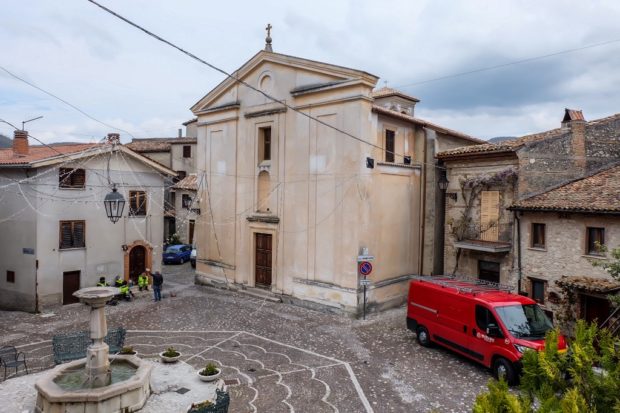Waiting for wifi: Italy’s digital divide

A general view shows a central square in Colle di Tora on April 21, 2021 with workers (left) and a van of the optical fiber installation company in the medieval town some 80 kilometers northeast of Rome. AFP
COLLE DI TORA, Italy — The last time a customer tried to pay by card in Anna Rita Pani’s grocery store in Colle di Tora, a small town outside Rome, things got a bit awkward.
“We had to wait 15 minutes for the card reader to work… Meanwhile, we were just standing there, staring at each other,” she told AFP.
Her card reader works with wifi, but Colle di Tora is one of the least connected towns in Italy — itself a digital laggard compared with the rest of the European Union.
Closing the gap is a priority for Prime Minister Mario Draghi and his drive to revive Italy’s coronavirus-ravaged economy with EU-funded investments.
He will on Monday present to parliament his plan to spend some 191.5 billion euros ($232 billion) in loans and grants from the EU’s post-virus recovery fund between now and 2026 — with digitalization expected to be a major focus.
For Italy, part of the challenge is to transform places like Colle di Tora, which are not so much cut off from the modern world, as a little behind.
Weather halts service
The medieval town some 80 kilometers (50 miles) northeast of Rome is a relatively popular tourist resort, nestled on a ridge overlooking a lake and close to waterfalls, woods and natural reserves.
“The situation here is OK, but if you need to send a bigger email it might take a few minutes instead of a few seconds,” said Mayor Beniamino Pandolfi.
Fortunately, Colle di Tora is on a government list of 200 municipalities earmarked for the publicly-subsidized rollout of fibre optic broadband.
This week, workers were laying fibre optic cables in one of the main squares, and telecoms company Open Fiber said super-fast internet would be operational by the year’s end.
“We’ll welcome it with open arms,” the mayor said.
At the moment the post office — which the town’s 360 residents rely on to withdraw cash, as there is no bank — sometimes closes down because its internet fails.
Bad weather can disrupt the signal, and is also a problem for mobile phone reception and streaming TV services.
Poor connectivity has become a serious problem since the start of the pandemic, which has forced people to spend months at home.
Simona Cardella, owner of a dry-cleaners, said her teenage daughter struggled with online lessons while schools were closed.
With video calls, “sometimes the audio is off, sometimes the video is off, and if the weather is bad the signal cuts off completely”, she said.
Sometimes unable to download the syllabus or upload her homework, her daughter was reduced “to do lessons via WhatsApp”, Cardella said.
Offline Italy
The government wants every Italian to have access to super-fast internet by 2026 — but it has a long way to go.
Nearly a quarter of Italians do not use the internet, and one third of households have no fixed connection, according to figures released last month by national statistics agency Istat.
Meanwhile only 30 percent of households had access to latest-generation broadband in 2019, albeit up 6.1 percentage points from the previous year.
Italy — the eurozone’s third biggest economy — was ranked fourth from the bottom in the European Commission’s latest index of digital competitiveness (DESI), beating only Bulgaria, Greece and Romania.
Mayor Pandolfi notes that taking the latest generation broadband to isolated areas like Colle Di Tora could make them attractive locations for remote working.
For other residents, it would just bring them into the 21st century.
Pani’s 22-year-old son Nicolas is a keen gamer, but he complains it can take “four-five days” to download a PlayStation game that his friends in Rome can get in a couple of hours.
“It’s not like I cannot live without it,” he said. “But if (the internet) was a little bit better it would be nice.”